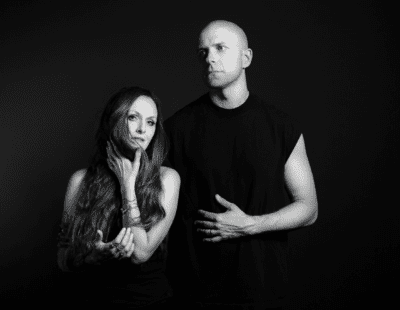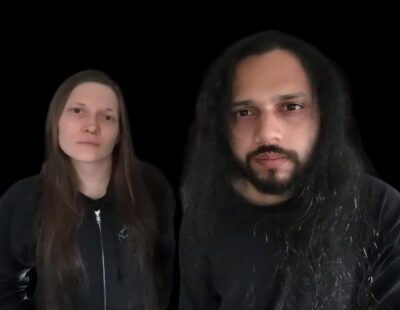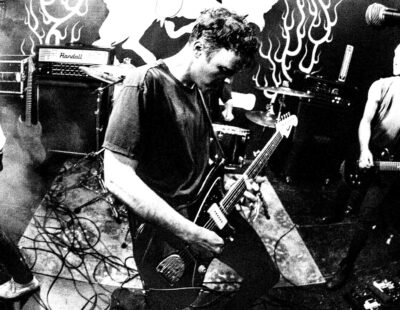
Undoubtably one of the most versatile and forward-thinking drummers to ever hammer his way up out of the underground, Will Shepler infused his backbeat brutality with real nuance and depth on Agnostic Front’s under-appreciated crossover banger One Voice before playing an integral role in changing the hardcore game forever on Madball classics Set it Off (1994) and Demonstrating My Style (1996).
Originally conceived as a “hardcore power trio” with his former Agnostic Front bandmate/current Sick of it All bassist Craig Setari and guitarist/vocalist Scott Roberts (ex-Biohazard/Bloodclot), Shepler’s latest outfit The Take quickly transformed into something considerably more expansive and multifaceted — a vibrant and enlivening amalgamation of hardcore, oi, punk, and pure street fightin’ rock n’ roll.
The band’s fantastic self-titled debut full-length — featuring Carlos Congote (45 Adapters; Urban Noise) on bass, stepping in for the hard-touring Setari — only dropped a few months ago via Demons Run Amok Entertainment, but when Decibel caught up with Shepler last week he was in the studio already laying down tracks for some yet undetermined future release before flying out early the next morning for a series of European dates.
Can’t stop. Won’t stop.
Ahead of The Take’s upcoming tour with Shepler’s old band Agnostic Front — part of the ongoing Victim in Pain 35th anniversary shows; itinerary embedded below — Shepler was kind enough to chat about his feral-yet-sophisticated artistry past, present, and future…
Whether we’re talking Agnostic Front, Madball, or The Take, you’ve always brought a lot of different, unexpected influences to the table, never really settled, always kept innovating. Can you talk to me a little bit about what drives you artistically? From the outside it seems like you’re sort of a searcher, someone who’s always trying to push…beyond.
I get bored easily, I guess. Doesn’t everybody? Well, probably some people more than others, but, me, I’ve always been a curious person. Even outside of music, I read pretty widely, about everything from photography to old maps. Love digging into all sorts of different eras of history. Love learning new things. When it comes to music, it’s the same thing. I’ll listen to everything from hardcore to progressive death metal to classical to bebop to jazz to classical. So I’m constantly exploring in everything, just by nature. And I definitely try to bring that attitude to what I do musically, but at the same time I can’t take too much credit: A lot of it is just luck. I’ve been really lucky to have so many different opportunities to do different kinds of things with really talented people who want to do interesting things. It’s not solo work, you know?
It seems like The Take is a real melting pot where you’re able to go particularly wild.
Yeah, absolutely. Total freedom. Right from the beginning, the songs really struck a chord with me — literally but also figuratively! It had influences from all sorts of stuff we listened to over the years; elements of all our past bands. The Take really is sort of a culmination of all that, all those different experiences. I know for Scott, too, writing the riffs — it’s coming from everywhere. It’s not just one specific thing. And he wouldn’t be able to write these songs if he didn’t have all those different experiences and gone through all the things he’s gone through and played in all the bands we’ve played in. We definitely made some mistakes along the way, but we always, always — always — want to do something honest, with integrity, that’s true to ourselves. And I think that that’s what makes a good good album or a good song. That’s the mindset we bring to The Take.

Was bringing about that “culmination” the intention for the band from the beginning?
Well, Scott and I have been friends for years, done other projects together. Just as he was leaving Biohazard I happened to be hanging out with Craig from Sick of It All. I was like, “Man, we should start, like, a hardcore power trio. Yeah, me, you, and Scott Roberts!” Craig was totally into it. I called Scott. He was down. So, that was the original idea — that everything would flow from hardcore. But it started to change pretty quickly. Also, everything wasn’t written all at once — that’s important, too. It came kind of in bits and pieces, which gave us time to organically develop the songs and naturally find our direction. For my part, I don’t worry at all about what I’m supposed to play. I just let the song bring whatever it needs out of me. What I’m doing is probably completely different from what somebody else would play. But that’s what makes different bands and music interesting, right? If you’re not putting your own spin on things, what’s the point?
I’m glad it expanded in the way that it did, you know what I mean? I’m glad we’ve managed to avoid being pigeonholed into any genre. Playing straight hardcore, sometimes you’re kind of hemmed in a little bit on how much you can explore. You’re always worrying about getting a hard breakdown part or something into the song. I love that hardcore is a part of this, but also that we gave ourselves the leeway to do anything.
At some point Craig departs…
It wasn’t a “hard feelings” thing at all. Craig was just on tour all the time with Sick of It All and eventually said, “You know what guys? I don’t want to hold you back.” Scott ended up calling Carlos from the 45 Adapters. They’ve been friends with for a while. It was really important to find somebody that fit with us not just musically but personality-wise. Maybe it works differently for other people, but Scott and I — especially at this point in our lives — need to be in a band with solid, down to earth guys. I want my friends close to me and any big egos somewhere else completely. That’s what The Take is. And Carlos is a great guy. He fit perfectly, right away. That’s the way it’s gotta be, ‘cause we’re not doing this to make a living. We’re doing it because we’re having fun and we’re passionate about these songs.
Actually, one of the interesting things about interviewing members of Madball and Agnostic Front, past or present, is that very real sense of family that in a way transcends even the music. Which, considering all the drama and strife in the punk and rock scenes generally, seems somewhat unique. It must be gratifying to have these enduring relationships that sometimes, like with The Take, intertwine and grow into new creative pursuits.
Yeah, definitely. It’s amazing. I mean, to be completely honest, there are some people who played in those bands that nobody talks to anymore. [Laughs.] But for the most part, yeah, we’re all very good friends. Hardcore is kind of like a big family, too. It’s not limited to people who play the songs, either. There are many, many people I’ve met from the scene who weren’t in bands with me — or bands at all! — who are definitely part of my lifelong extended family. I’ll always be grateful for those relationships and that scene. And can’t imagine who I’d be without it. Again, I just feel lucky to have been in some good bands with some good people. It’s taken me a lot of interesting places, let to a lot of priceless experiences.

These upcoming shows with Agnostic Front… Is that an interesting experience for you to go and play shows with a band you played with in the past?
I’ll tell you when it’s over, you know? I’m excited, though. Most of those shows to be in a UK, smaller type places. So, it should be a lot of fun. I love those packed shows. You can just feel the energy in the room. Of course it’ll be a little strange to me opening up for them, but not as much as it used to be. The hardest, I think, was right after I left the band going to see them. Same with Madball. I remember that was a little difficult for me to go watch them right after I left the band. Kind of wished I was up there again. But now it’s been so long — they’ve gone through so many changes; I’m different now. It’s what we just talked about, you know? They’re like my brothers. I love those guys like family.
Does it get harder to do what you do now that you’ve got a nuclear family — a wife, kids, a career, etcetera?
Of course. Everybody gets that. But, at the same time, my wife is so supportive. She understands that I would only fully invest myself in something like this if it has a part of my heart, if it’s got a soul. I wouldn’t ask her to make a sacrifice — or make a sacrifice myself — for a band that was just like, Whatever. Here’s some kinda cool songs, I guess. Life is short. You’ve got to do what makes you happy.Get as as much as you can out of it. As long as I can pay my bills and play music I’m happy.
Life is short, but you’ve had a lot of longevity in music.
Yeah, I guess it might seem like that. But I’ve known Vinnie Stigma a long time now — I got nothing on him in the longevity department! Following his example, I did learn a little bit about the secret behind sticking around, though: Work hard, have integrity, play from the heart. All the other stuff can be hard sometimes, but that’s what I try to focus on.
Speaking of hard work, you’re about to lay down some tracks right now before flying out to Europe tomorrow morning.
Of course. You’ve got to strike when the iron’s hot, right?
Edited for clarity and length. For more information visit The Take’s official website.






